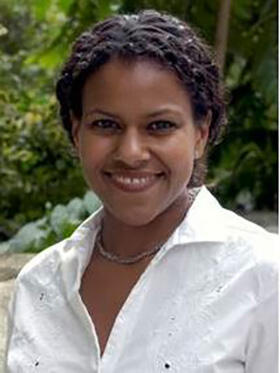
LSTM’s Seminar Series continued this week with a presentation by Dr Lesong Conteh, Senior Lecturer in Health Economics at Imperial College London. Her seminar “The market for community health workers” was introduced by Director if CAHRD, LSTM’s Professor Bertie Squire.
Dr Conteh began by explaining her interest in community health workers (CHW) which came about due to her involvement in several malaria related studies carried out with a number of colleagues based at Cheikh Anta Diop University, Senegal; Department of Public Health, University of Bamako, Mali; Centre National de Recherche et de Formation sur le Paludisme, Burkina Faso and London School of Hygiene and Tropical Medicine. She referred to two particular studies which looked at preventative strategy for malaria amongst children in Mali, Burkina Faso and Senegal: Seasonal Malaria Chemoprevention (SMC). When looking at delivery strategies she became particularly interested in the role of CHWs.
She started by looking at who CHWs are: anyone of a myriad of people, some of whom are volunteers, but could be birth attendants, village health workers, lay health workers and community health volunteers. According to the WHO definition, a CHW is a member of the community, selected by the community, answerable to the community, supported by health systems and with a period of training shorter than that of professionals. Dr Conteh talked through the recent history of the CHWs, their rise to prominence in the 1970s, loss of momentum in the 80s, with renewed interest in the 1990s and the last 15 years seeing a re-energised debate regarding their roles and their current status.
During her seminar Dr Conteh discussed two different studies involving CHWs, the first was a qualitative study based in Mali and Burkina Faso undertaken in parallel with a double blind placebo controlled trial of SMC where various stakeholders spoke about their perceptions of CHW roles. She explained their analytical framework, looking at organisation and management, implementation and delivery and interface with the community and health care professionals. While the data are still being analysed, the results so far show that the community did not know how CHW’s had been selected, with many thinking they had been mandated by government. Most of the community understood that they were not there to treat people, but to provide support, to facilitate contact and to keep the patient informed. Using this information to look at the market for CHWs it is clear that there needs to be more understanding of their roles.
The second study was carried out in Senegal, a quantitative study looking at a malaria intervention using the CHW network. 182 CHWs were asked to fill in diary sheets outlining their tasks, the time they spent working, any incentives they received and who was the sponsor of that work. The same CHWs were then interviewed during the year to find out more about their personal characteristics and experiences as CHWs. Only seven diarists dropped out of the process and a massive 33,879 individual tasks were identified. Preliminary analysis suggests that the average time carried out daily as a CHW was six hours and the sponsors or funders of the tasks numbered over 250. The interviews highlighted that the vast majority were female, most aged between 31-40 years, mostly married and that their ethnic and religious grouping reflected the areas in which they worked.
Dr Conteh explained the motivating factors for becoming a CHW according to the interviews, with most wanting to help the community and give basic health advice. They listed the positive aspects of the work as being trusted and confided in and the recognition of the work was described as heart-warming. They listed the difficulties as people being late or difficult to contact for follow up consultations and working not for a salary but for just ‘breadcrumbs’.
She concluded by saying there needs to be a renewed focus on CHW and that there is a growing recognition that there needs to be a clearer financial remuneration for their work. There is still a debate as to whether it is better to leave their roles as generalised or targeted. She acknowledged that CHWs are an answer in part to the growing human resource crisis but that more work is needed to look at their increasing roles, responsibilities and cost effectiveness.